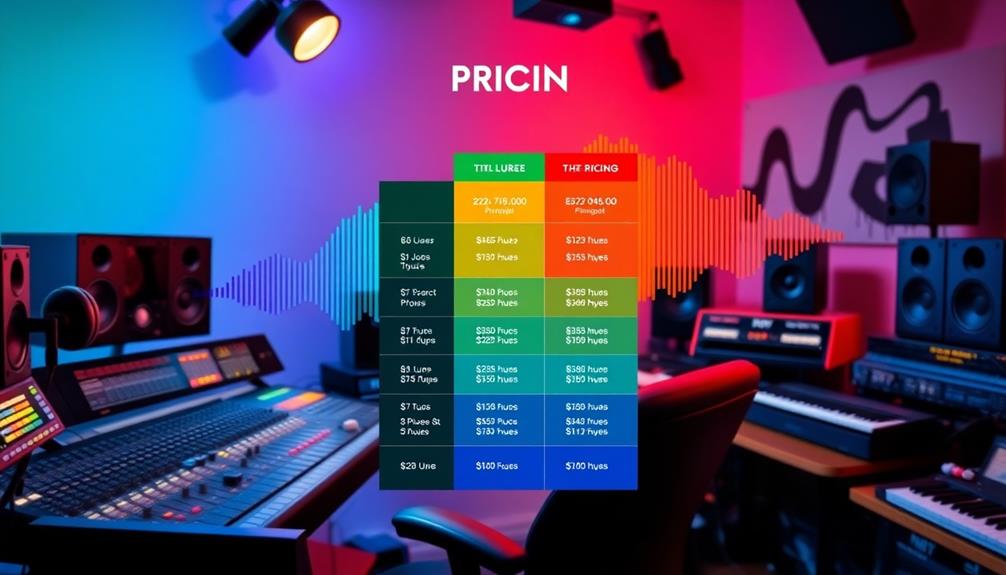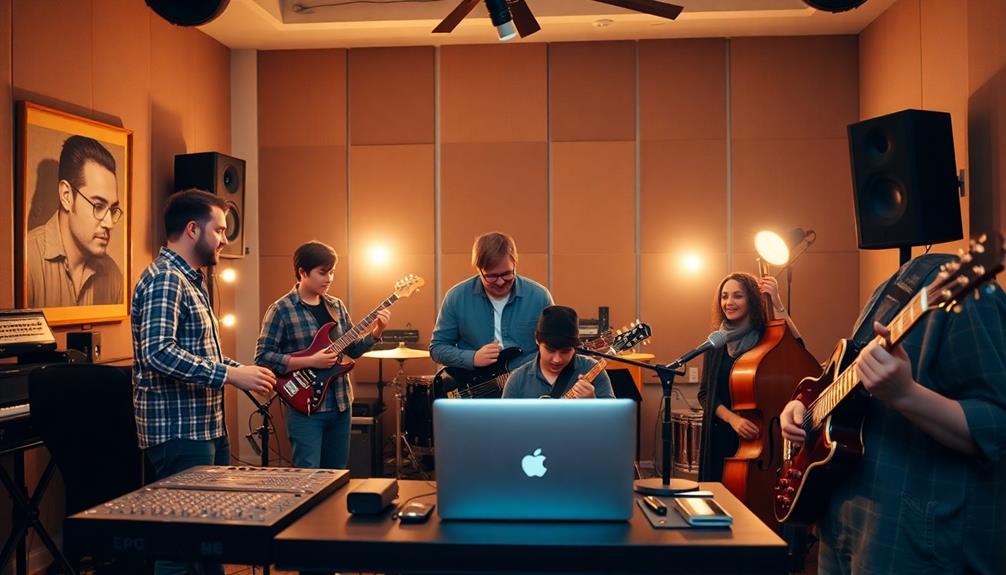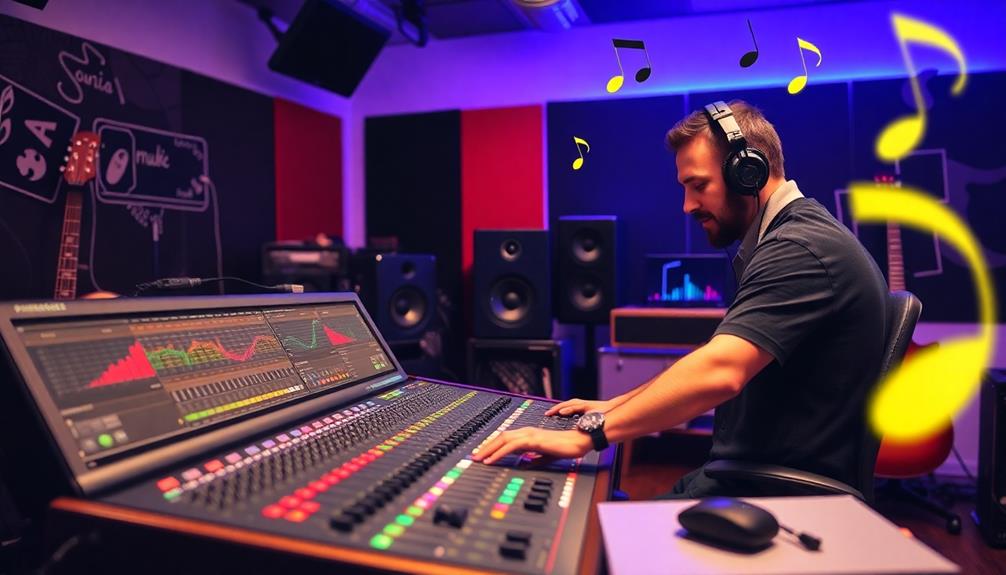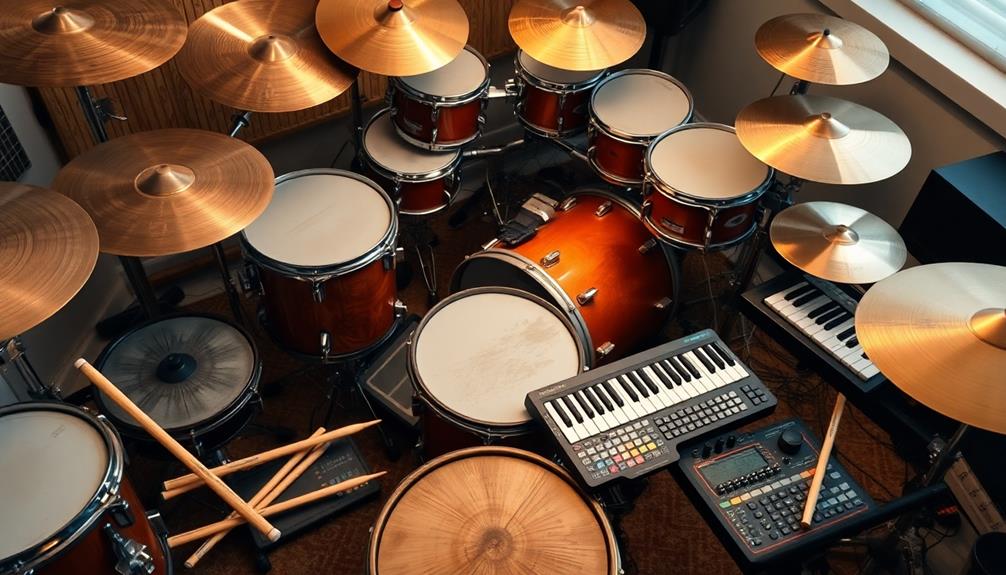To charge what you're worth in music production, start by understanding your unique skills and experience level. Novice producers can charge around $100 per minute, while seasoned professionals often exceed $300. Research your competitors to set fair rates and build your portfolio to justify higher prices. Consider factors like project complexity and your expenses, including studio and travel costs. Effective communication fosters strong client relationships, leading to repeat business. By mastering these strategies, you can elevate your pricing game. Stick around to discover more techniques that will fine-tune your approach and boost your income potential.
Key Takeaways
- Assess your experience, skills, and unique qualities to determine your base pricing.
- Research competitor rates and industry standards to establish fair charges for your services.
- Factor in all overhead expenses, including studio costs and travel, to ensure profitability.
- Consider the complexity of projects when setting fees, as full arrangements require higher rates.
- Build strong client relationships through effective communication and quality delivery to encourage repeat business.
Understanding Your Value

Understanding your value as a music producer is fundamental for setting the right prices for your services. Start by evaluating your experience level, skills, and the unique qualities you bring to your music production projects. This self-assessment plays an important role in determining what you can charge.
For instance, novice producers typically start at around $100 per minute, while those with intermediate and advanced skills can command upwards of $300 per minute. Additionally, it's important to take into account how your personal anecdotes and relatable examples can differentiate you from competitors and showcase your unique style.
Researching competitor pricing and industry standards is also significant. It helps you identify a fair rate that reflects your capabilities without undervaluing yourself. As you build your reputation and portfolio, you can justify higher rates, especially if your work stands out in quality and uniqueness.
Confidence in your pricing is key. Many freelancers struggle with this, often underestimating their skills and missing out on better compensation. By understanding your value, you can set prices that not only reflect your experience but also the distinctiveness of your music production services.
Embrace your worth, and don't hesitate to charge what you deserve.
Pricing Strategies for Different Levels

As you set your prices, it's important to contemplate the different levels of experience within the music production industry.
Entry-level producers typically charge between $500 to $1,500 per track. This pricing strategy attracts initial clients while you focus on building your portfolio.
As you gain experience, mid-level producers command rates from $500 to $5,000 per song, offering polished tracks and more creative input based on your growing track record.
For high-level producers, who often have notable credits, the charge can start at $5,000 and go up. At this level, you manage major label budgets and provide unique sonic identities that justify your higher rates.
When determining your pricing, consider key factors such as the complexity of the project. Full arrangements generally cost more than simpler productions, reflecting your experience and reputation.
Additionally, think about your payment structures; flat fees guarantee immediate income, while a combination of upfront fees and royalties can maximize your long-term earnings.
Evaluating Overhead and Expenses

Evaluating overhead and expenses is essential for maintaining a profitable music production business. To create a sustainable pricing strategy, you need to account for all your overhead costs, including studio expenses, travel costs, and any fees associated with session work or online platforms. By doing this, you can guarantee your pricing covers these critical elements.
Here's a simple breakdown of common expenses to take into account:
| Expense Type | Examples | Approximate Costs |
|---|---|---|
| Studio Expenses | Rent, utilities, insurance | Varies by location |
| Travel Costs | Gas, vehicle wear, ride-sharing | $0.50/mile or more |
| Processing Fees | Credit card fees, CRM costs | 2-5% of transaction |
When calculating your overhead, don't forget about commission fees that might apply. This thorough analysis helps you set a pricing strategy that not only covers your expenses but also allows for profitability. By being diligent in evaluating these costs, you can build a financially stable production business while delivering quality services to your clients.
Market Research Insights

Market research plays an essential role in shaping your pricing strategy for music production services. By conducting local searches on platforms like Prodverse, BeatStars, and Airbit, you can uncover valuable insights into pricing trends and competitor strategies.
Philosophical exploration encourages you to reflect on the value of your unique offerings as you pay close attention to the costs associated with non-exclusive licenses, typically ranging from $20 to $100, and exclusive licenses, which can vary from $300 to over $5,000 depending on your reputation and the quality of your work.
Understanding the factors that influence your pricing is important. For instance, the cost of living in major markets like Los Angeles and New York often allows you to command higher fees. Additionally, evaluating genre demand is significant; pricing can fluctuate based on the popularity and market size of different music styles.
Regularly monitoring sales trends helps you adjust your pricing strategy effectively. If certain beats are in high demand, don't hesitate to raise your rates. Conversely, if sales are slow, consider lowering your prices to stimulate interest.
Keeping a close eye on these aspects will empower you to price your services competitively and fairly.
Building Client Relationships

Building strong client relationships is vital for your long-term success in music production, since repeat clients often lead to higher-paying opportunities and valuable referrals. Focus on effective communication and set clear expectations from the start. This alignment guarantees both you and your clients are on the same page throughout the project.
Trust plays a significant role too. Deliver quality work consistently to enhance your reputation, encouraging clients to invest more in future projects. Networking within the industry widens your reach, connecting you with potential clients and collaborators. Attend events, engage on social media, and join forums to build your network.
Finally, don't overlook the importance of follow-ups. Engaging with clients post-project solidifies relationships and fosters loyalty, making it more likely they'll return for future projects. Here's a quick guide to help you focus on key aspects of building strong client relationships:
| Key Aspect | Importance | Action Steps |
|---|---|---|
| Effective Communication | Aligns expectations | Set clear timelines and goals |
| Trust | Enhances reputation | Deliver quality work consistently |
| Networking | Expands opportunities | Attend events and engage online |
| Follow-ups | Solidifies relationships | Check in post-project |
Frequently Asked Questions
How Much to Charge for Music Production Services?
When determining how much to charge for music production services, consider your experience, the project's complexity, and market demand. Entry-level producers might charge $500-$1,500, while seasoned professionals can command $5,000 or more per track.
How Do I Charge as a Music Producer?
To charge as a music producer, research local rates, assess your skills, and consider the genre. Set a flat fee or negotiate for royalties, ensuring your pricing reflects the value you bring to clients. To stand out, provide potential clients with samples of your work and testimonials from previous projects to build trust. Additionally, focus on networking and leveraging social media platforms to showcase your expertise and grow your email audience, which can help you reach more artists and collaborators. By maintaining clear communication and delivering high-quality results, you’ll establish your reputation and attract more opportunities in the industry.
How Much Should I Charge for Music Commissions?
When deciding how much to charge for music commissions, consider your experience level, project complexity, and market standards. Start with $100 per minute for beginners, adjusting upwards as you gain expertise and recognition.
How to Price Yourself as a Producer?
Imagine a gardener nurturing a delicate plant. You need to assess your skills and market demand. Research competitors, understand your costs, and offer flexible pricing. Balance flat fees and royalties, ensuring your growth thrives sustainably.
Conclusion
To sum up, charging what you're worth is essential for your success as a music producer. By understanding your value and researching the market, you can set prices that reflect your skills and expertise. For instance, imagine a producer who initially charged $500 per track but, after evaluating their unique sound and demand, raised their fee to $1,500. They found that clients were not only willing to pay more but also appreciated the quality and professionalism they delivered.










